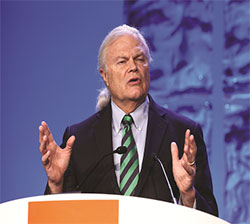What does it take for an ophthalmologist to carve out a career that’s both productive and happy? In an interview with 2016 Academy President William L. Rich III, MD, FACS, YO Info got his answers, based on nearly 40 years of volunteer service.

Dr. Rich discusses the Academy’s IRIS® Registry during a presentation.
Dr. Rich has worn many professional hats for the Academy and medicine throughout his career, among them: secretary for federal affairs, medical director of health policy, head of the Academy’s IRIS® Registry Executive Committee and chair of the American Medical Association’s Relative Value-Scale Update Committee. He’s also championed many of ophthalmology’s most pressing issues on Capitol Hill — from health care financing to physician reimbursement and clinical quality metrics — all while maintaining a private practice.
“A lot of young docs say, ‘Can you do all that and still maintain a private practice?’ Obviously I had to because I don’t get paid a salary. I get paid by my productivity,” Dr. Rich said.
He shared his two most important tips for young ophthalmologists, based on lessons he’s learned in his own career.
Tip #1: Raise Your Hand
If there’s one thing that Dr. Rich’s career has taught him, it’s to put yourself out there.
“Having attended Georgetown University as an undergraduate and been exposed to its classic Jesuit education — ‘glory to God through service to others’ — I’ve always been interested in policy,” Dr. Rich said.
Thus in 1978, during his oral boards in Philadelphia, Dr. Rich walked up to then-Academy Executive Vice President Bruce E. Spivey, MD, and asked a simple question: What is the Academy doing about the National Health Planning Act? Little did Dr. Rich know at the time, but that seemingly ordinary exchange — simply asking about something that piqued his interest — would set the course of his career.
Shocked and intrigued by the question, Dr. Spivey asked Dr. Rich to write a letter addressing his concerns. “This scared the hell out of me at the time because I was only 32, and yet a leader of the Academy wanted me to get involved,” said Dr. Rich. “But unlike many organizations, the Academy, then and now, has always looked beyond seniority and reached out to YOs with opportunities.”
“Bill was obviously a very bright physician,” said Dr. Spivey. “He communicated clearly, he had a passion for quality and he cared about the specialty of ophthalmology — so it was very easy to slot him in and get him working with the Academy.”
The young Dr. Rich was now on his way. That same year he started as a volunteer in the Academy’s Washington, D.C. office with a staff of one and quickly became ensconced in Academy politics, forging a relationship that’s now in its 39th year.
“The rest is history, so they say, but there’s an important lesson here,” Dr. Rich said. “If something interests you or somebody asks for a volunteer, raise your hand and learn about it,” he said. “That’s such an important thing, and my career is proof — I knew next to nothing about politics and policy at the time, but I realized that I had to get started somehow.”
Tip #2: Find Intellectual Stimulation
As Dr. Rich moved through his career, he realized he could easily put it in cruise control. But he didn’t — he continually sought out different sources of intellectual growth outside of practice.
“Look, all young ophthalmologists are smart and good at what they do,” said Dr. Rich. “But one of the things you need to watch for is getting into a rut.”
So, whether it’s working with the Academy, getting involved in health policy or volunteering your time, he suggests taking a look at the bigger world around you and engaging with it. “This is an important message to YOs as well as physicians of all ages,” he added. “Find something intellectually challenging that will provide another way in which to learn about and develop yourself.”
Dr. Rich has lived out this advice. “I went from health policy to manpower to practice management to socio-economics to quality improvement,” he said. “So I perceived the need, at different points in my career, to try out and learn something different.” He continues that habit today. At his current practice, Northern Virginia Ophthalmology Associates, it’s recommended that physicians work only four days a week in order to encourage volunteer work.
His Future as President
Whether he’s on Capitol Hill or in his northern Virginia office, Dr. Rich’s motivations are always centered on patients. “If you look at all of medicine, there are two specialties that have the highest job satisfaction — ophthalmology and pediatrics,” he said. “What they share in common is an ongoing linear relationship with patients and family — we see the kids of the kids of the kids that we started with.”
What sets ophthalmology apart, he said, is that, as surgeons, ophthalmologists also do things that are very beneficial for patients. “When I do cataracts, I get hugs,” he added. “We really are afforded the opportunity to have wonderful careers.”
As Academy president, Dr. Rich will continue to mobilize ophthalmologists to raise their collective voice so the government can more clearly understand how all parties’ actions directly impact the care of patients.
“If there’s anyone who has ‘earned’ the right to be our profession’s elected leader, it’s Bill,” said Academy CEO David W. Parke II, MD. “It is absolutely fitting that ophthalmology be represented by such a strong and candid defender of patients and of our profession.”
* * *
About the author: Mike Mott is a former assistant editor for EyeNet Magazine and contributing writer for YO Info.